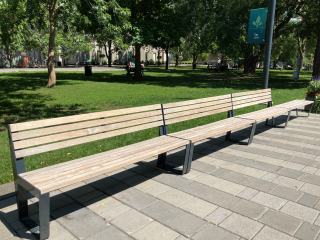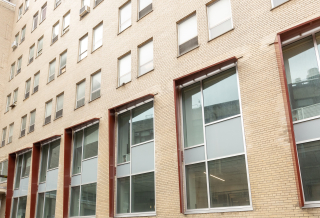FMAS aspires to enhance the on-campus experience of the McGill community while adhering to principles of sustainable growth and responsible stewardship.
Construction & renovation
FMAS takes sustainability into account starting at the design phase of construction and renovation projects. Decisions are made based on lifecycle analyses comparing the sustainability of one option over another.
Project teams are required to pursue bold levels of energy efficiency and sustainable design.
Products and materials
Our product requirement standard contributes to a more sustainable campus. It is one of McGill’s building design standards which are intended as a general rule for most circumstances and provide direction to construction design professionals.
Products and materials are to be selected based on a hierarchy of performance criteria, including:
- Levels of volatile organic compounds (VOC) emissions (gases emitted from certain materials that may have adverse effects on our health)
- Human and environmental toxicity
- Sustainable harvesting and extraction practices (e.g. favouring wood products harvested from sustainable forests)
- Disclosure of environmental impacts
 Benches on the lower campus main road that are made of FSC-certified non-tropical hardwood.
Benches on the lower campus main road that are made of FSC-certified non-tropical hardwood. - End-of-life management (e.g. opting for products which can be given back through take-back programs)
- Recycled content
- Local sourcing
- Disclosure of sustainability practices of the manufacturer
The choice of material for the new benches along the lower campus main road is a concrete example of how McGill implemented this standard. We moved away from tropical hardwood and opted for FSC-certified non-tropical hardwood.
Well-being

The WELL certification is a roadmap for promoting the physical and psychological health of occupants through design decisions. Examples within McGill’s building design standards include:
Daylight and quality views
Our sustainable design standard sets out the need for projects to maximize daylight while controlling for glare, and as much as possible include unobstructed views to the exterior.
Biophilic design
Projects should incorporate and encourage occupants’ access to nature within and around the building.
Restorative spaces
Indoor and outdoor spaces supporting restorative practices of a building’s occupants need to be included in new construction and major renovation projects. These are spaces designated for contemplation, relaxation and restoration.
Workspaces
Projects on campus should also incorporate work zones that support various work functions, such as designated quiet zones and collaboration zones.
Accessibility
McGill’s goal is to provide indoor and outdoor environments which can be universally accessed by the widest variety of users, regardless of age, disability or other factors.
One of the guiding principles of the university’s master plan is that pedestrians should be prioritized over vehicles and networks should be designed to ensure safety and accessibility.
Whenever construction interventions are initiated, accessibility must be taken into consideration and improvements made. For example, the renovation of Wilson Hall will include a main and accessible entrance from James Square.
Additionally, McGill allocates $2M annually to capital projects specifically aimed at enhancing universal accessibility on its campuses.
LEED certification or equivalence
 McGill has long been integrating LEED-equivalent standards in its construction and renovation projects. Two of its major projects on the downtown campus have obtained LEED certification:
McGill has long been integrating LEED-equivalent standards in its construction and renovation projects. Two of its major projects on the downtown campus have obtained LEED certification:
- The Bellini Life Sciences Building, inaugurated in 2008, obtained LEED Gold certification.
- The Armstrong Building, which houses the Desautels Faculty of Management’s master’s programs, was granted LEED Silver certification following a major renovation completed in 2017.
McGill has also obtained LEED certification for the central hub for the Alan Edwards Centre for Research on Pain at the Lyman Duff Building (Gold), the green chemistry labs in the Pulp and Paper Building (Gold), and is in the process of pursuing LEED certification for a research lab at the Gault Nature Reserve and a new greenhouse at Macdonald campus.
The most widely used green building rating system in the world, LEED stands for Leadership in Energy and Environmental Design. It is a framework to reduce energy and water consumption, reduce waste production, improve indoor air quality, and other matrices related to the sustainability of a building. There are four levels of LEED certification:
- Certified
- Silver
- Gold
- Platinum
McGill's new Gold standard
In its Climate and Sustainability Strategy 2020-2025, McGill set as a requirement that all new construction and major renovation projects be, at minimum, LEED Gold certified.
This requirement applies to the construction of all new buildings and renovations consisting of more than 50% of a building's floor area. In this respect, McGill is pursuing LEED Gold certification for two of its major infrastructure projects, the New Vic and Fiat Lux.
For major interior fit-outs, meaning renovation of more than 500 m2 of a building and the modification of two or more building systems, McGill aims for LEED Gold equivalency. Equivalence is defined as the integration of LEED Gold criteria without officially submitting the project for certification.
It is not possible to submit for certification all of McGill’s projects due to technical constraints, limited scopes and/or financial constraints. For example, projects that are in historic buildings which cannot be properly insulated for technical reasons might fail to meet the energy performance prerequisites.
However, our building design standards are developed to apply best practices across construction and renovation projects even without pursuing certification per se.
Total cost of ownership
McGill requires that a Total Cost of Ownership (TCO) analysis be conducted for all major construction and renovation projects. TCO is an estimation of the expenses associated with purchasing, deploying, using and retiring a product or piece of equipment. TCO, or actual cost, quantifies the cost of the purchase across the product's or equipment’s entire lifecycle. TCO analyses help identify the solutions best aligned with a sustainable and efficient management of McGill’s financial and human resources, and of its physical infrastructure.
Maintenance and operations
Besides ensuring sustainability in the planning, design and construction phases, FMAS also integrates sustainable practices in the daily maintenance and operations of its buildings and grounds.
Measures include:
- The development and implementation of regular preventative maintenance programs, contributing to a longer lifespan of our equipment.
- The phase-out of petrochemical-based cleaners in regular janitorial services, replacing them with cleaning products that conform to environmental standards.
- The use of microfibre cloths as opposed to conventional rags, minimizing the amount of cleaning product necessary.
- The use of water-only floor scrubbing machines and steam-cleaning wands, which saves about 515 L of cleaning products annually.
- The ban of chemical pesticides and herbicides in campus landscaping.
- The composting of leaves, eliminating the need to purchase mulch or compost.
Printing Services
Our Printing Services are also making their operations more sustainable by:
- Using recycled paper for printing jobs whenever possible.
- Participating in a carbon neutral program to offset GHG emissions related to the manufacturing of the products used.
Water consumption
McGill aims to reduce its water consumption. Water meters have been installed in all buildings on the downtown campus and on the main water inlets at the Macdonald campus, making the future collection of detailed data on our water consumption possible. The McGill design standards require the installation of WaterSense labeled low-flow fixtures to ensure water efficiency and performance.
Accurate water consumption assessments will enable McGill to quantify the impact of water conservation initiatives as they are implemented, while FMAS works toward reducing the water use by mechanical equipment and other fixtures.
